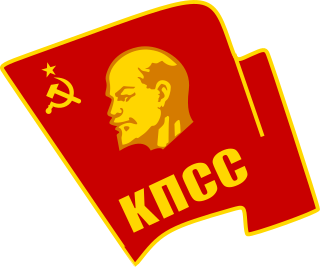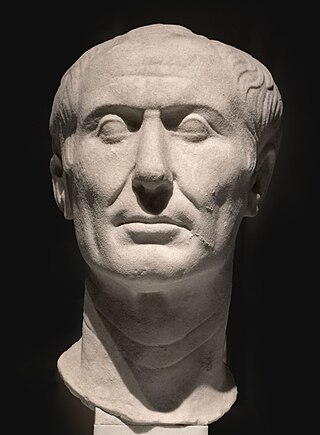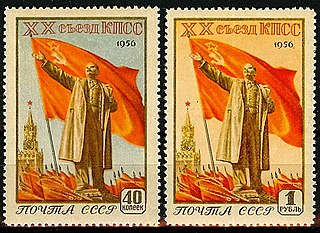"Communism in 20 years" was a slogan put forth by Nikita Khrushchev at the 22nd Congress of the Communist Party of the Soviet Union in 1961. Khrushchev's quote from his speech at the Congress was from this phrase: "We are strictly guided by scientific calculations. And calculations show that in 20 years we will build mainly a communist society". [a]
In his speech, Khrushchev promised that the communist society would be built "in the main" by 1980. [1] His assertion that "The current generation of Soviet people will live under communism" was the final phrase of the Third Program of the CPSU, which was adopted at the congress.
The latter political slogan is attributed to Kremlin speechwriter Elizar Kuskov, who allegedly quipped "this slogan will survive centuries", [b] expressing a cynical attitude as to whether the goal could genuinely be attained. [2]

The Communist Party of the Soviet Union (CPSU), at some points known as the Russian Communist Party, All-Union Communist Party and Bolshevik Party, and sometimes referred to as the Soviet Communist Party (SCP), was the founding and ruling political party of the Soviet Union. The CPSU was the sole governing party of the Soviet Union until 1990 when the Congress of People's Deputies modified Article 6 of the 1977 Soviet Constitution, which had previously granted the CPSU a monopoly over the political system. The party's main ideology was Marxism–Leninism. The party was outlawed under Russian President Boris Yeltsin's decree on 6 November 1991, citing the 1991 Soviet coup attempt as a reason.

Leninism is a political ideology developed by Russian Marxist revolutionary Vladimir Lenin that proposes the establishment of the dictatorship of the proletariat led by a revolutionary vanguard party as the political prelude to the establishment of communism. Lenin's ideological contributions to the Marxist ideology relate to his theories on the party, imperialism, the state, and revolution. The function of the Leninist vanguard party is to provide the working classes with the political consciousness and revolutionary leadership necessary to depose capitalism.
Bolshevism is a revolutionary socialist current of Soviet Leninist and later Marxist–Leninist political thought and political regime associated with the formation of a rigidly centralized, cohesive and disciplined party of social revolution, focused on overthrowing the existing capitalist state system, seizing power and establishing the "dictatorship of the proletariat".

The Sino-Soviet split was the gradual worsening of relations between the People's Republic of China (PRC) and the Union of Soviet Socialist Republics (USSR) during the Cold War. This was primarily caused by doctrinal divergences that arose from their different interpretations and practical applications of Marxism–Leninism, as influenced by their respective geopolitics during the Cold War of 1947–1991. In the late 1950s and early 1960s, Sino-Soviet debates about the interpretation of orthodox Marxism became specific disputes about the Soviet Union's policies of national de-Stalinization and international peaceful coexistence with the Western Bloc, which Chinese leader Mao Zedong decried as revisionism. Against that ideological background, China took a belligerent stance towards the Western world, and publicly rejected the Soviet Union's policy of peaceful coexistence between the Western Bloc and Eastern Bloc. In addition, Beijing resented the Soviet Union's growing ties with India due to factors such as the Sino-Indian border dispute, and Moscow feared that Mao was too nonchalant about the horrors of nuclear warfare.

The terms enemy of the people and enemy of the nation are designations for the political opponents and for the social-class opponents of the power group within a larger social unit, who, thus identified, can be subjected to political repression. In political praxis, the term enemy of the people implies that political opposition to the ruling power group renders the people in opposition into enemies acting against the interests of the greater social unit: society, the nation, etc.

"We will bury you" is a phrase that was used by Soviet First Secretary Nikita Khrushchev, leader of the USSR, while addressing Western ambassadors at a reception at the Polish embassy in Moscow on November 18, 1956. The phrase was originally translated into English by Khrushchev's personal interpreter Viktor Sukhodrev. The phrase was received very negatively by contemporary Western audiences, but some modern translators have suggested the phrase was misinterpreted or mistranslated.

Neo-Stalinism is the promotion of positive views of Joseph Stalin's role in history, the partial re-establishing of Stalin's policies on certain or all issues, and nostalgia for the Stalinist period. Neo-Stalinism overlaps significantly with neo-Sovietism and Soviet nostalgia. Various definitions of the term have been given over the years. Neo-Stalinism is being actively promoted by Eurasianist currents in various post-Soviet states and official rehabilitation of Stalin has occurred in Russia under Vladimir Putin. Eurasianist philosopher Aleksandr Dugin, an influential neo-Stalinist ideologue in Russian elite circles, has praised Stalin as the “greatest personality in Russian history”, comparing him to Ivan IV who established the Tsardom of Russia.

The 22nd Congress of the Communist Party of the Soviet Union was held from 17 to 31 October 1961. In fourteen days of sessions, 4,413 delegates, in addition to delegates from 83 foreign Communist parties, listened to Nikita Khrushchev and others review policy issues. At the Congress, the Sino-Soviet split hardened, especially due to Soviet de-Stalinization efforts, and it was the last Congress to be attended by the Chinese Communist Party. The Congress elected the 22nd Central Committee.
Russian political jokes are a part of Russian humour and can be grouped into the major time periods: Imperial Russia, Soviet Union and post-Soviet Russia. In the Soviet period political jokes were a form of social protest, mocking and criticising leaders, the system and its ideology, myths and rites. Quite a few political themes can be found among other standard categories of Russian joke, most notably Rabinovich jokes and Radio Yerevan.

The Polish October, also known as the Polish thaw or Gomułka's thaw, also "small stabilization" was a change in the politics of the Polish People's Republic that occurred in October 1956. Władysław Gomułka was appointed First Secretary of the ruling Polish United Workers' Party (PZPR) marking the end of Stalinism in Poland.

Before the perestroika Soviet era reforms of Gorbachev that promoted a more liberal form of socialism, the formal ideology of the Communist Party of the Soviet Union (CPSU) was Marxism–Leninism, a form of socialism consisting of a centralised command economy with a vanguardist one-party state that aimed to realize the dictatorship of the proletariat. The Soviet Union's ideological commitment to achieving communism included the national communist development of socialism in one country and peaceful coexistence with capitalist countries while engaging in anti-imperialism to defend the international proletariat, combat the predominant prevailing global system of capitalism and promote the goals of Russian Communism. The state ideology of the Soviet Union—and thus Marxism–Leninism—derived and developed from the theories, policies, and political praxis of Marx, Engels, Lenin, and Stalin.

Joseph Stalin's cult of personality became a prominent feature of Soviet popular culture. Historian Archie Brown sets the celebration of Stalin's 50th birthday on 21 December 1929 as the starting point for his cult of personality. For the rest of Stalin's rule, the Soviet propaganda presented Stalin as an all-powerful, all-knowing leader, with Stalin's name and image displayed all over the country.
The Albanian–Soviet split was the gradual worsening of relations between the Union of Soviet Socialist Republics (USSR) and the People's Republic of Albania, which occurred in the 1956–1961 period as a result of Soviet leader Nikita Khrushchev's rapprochement with Yugoslavia along with his "Secret Speech" and subsequent de-Stalinization, including efforts to extend these policies into Albania as was occurring in other Eastern Bloc states at the time.

Khrushchev: The Man and His Era is a 2003 biography of Soviet leader Nikita Khrushchev. Written by William Taubman, the book is the first in-depth and comprehensive American biography of Khrushchev. Taubman was the recipient of the 2004 Pulitzer Prize for Biography or Autobiography, as well as the 2004 National Book Critics Circle Award. The author spent almost 20 years researching the life of Khrushchev in preparation to write the book. Extensive research was made possible through access to archives in Russia and Ukraine, which were opened to the public following the collapse of the Soviet Union. In addition to printed materials and documentation, he spent time engaging Khrushchev's children and extended relatives, resulting in over 70 personal interviews. Taubman presents a historical narrative and study of the life of Nikita Khrushchev, the Soviet leader who succeeded Joseph Stalin. The book concludes with Khrushchev's death on September 11, 1971.
On the Cult of Personality and Its Consequences, popularly known as the Secret Speech, was a report by Soviet leader Nikita Khrushchev, First Secretary of the Communist Party of the Soviet Union, made to the 20th Congress of the Communist Party of the Soviet Union on 25 February 1956. Khrushchev's speech was sharply critical of the rule of the deceased General Secretary and Premier Joseph Stalin, particularly with respect to the purges which had especially marked the last years of the 1930s. Khrushchev charged Stalin with having fostered a leadership cult of personality despite ostensibly maintaining support for the ideals of communism. The speech was leaked to the West by the Israeli intelligence agency Shin Bet, which received it from the Polish-Jewish journalist Wiktor Grajewski.

The 20th Congress of the Communist Party of the Soviet Union was held during the period 14–25 February 1956. It is known especially for First Secretary Nikita Khrushchev's "Secret Speech", which denounced the personality cult and dictatorship of Joseph Stalin.
Socialism in one country was a Soviet state policy to strengthen socialism within the country rather than socialism globally. Given the defeats of the 1917–1923 European communist revolutions, Joseph Stalin encouraged the theory of the possibility of constructing socialism in the Soviet Union alone. The theory was eventually adopted as Soviet state policy.

The political slogan "Workers of the world, unite!" is one of the rallying cries from The Communist Manifesto (1848) by Karl Marx and Friedrich Engels.
De-Stalinization comprised a series of political reforms in the Soviet Union after the death of long-time leader Joseph Stalin in 1953, and the thaw brought about by ascension of Nikita Khrushchev to power, and his 1956 secret speech "On the Cult of Personality and Its Consequences", which denounced Stalin's cult of personality and the Stalinist political system.

The Third Program of the CPSU was a party platform of the Communist Party of the Soviet Union, adopted at its 22nd Congress on 31 October 1961. The main goal of the program was to create a plan for the construction of communism.